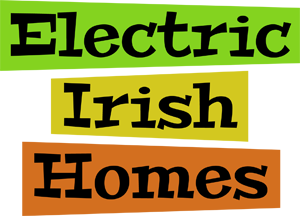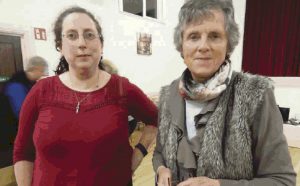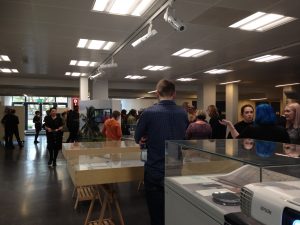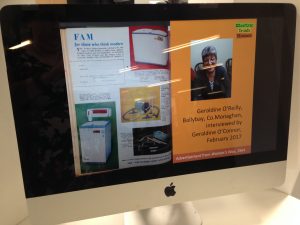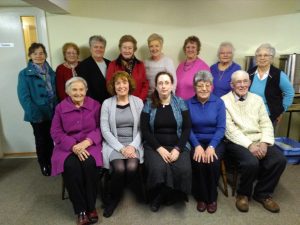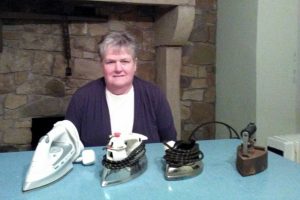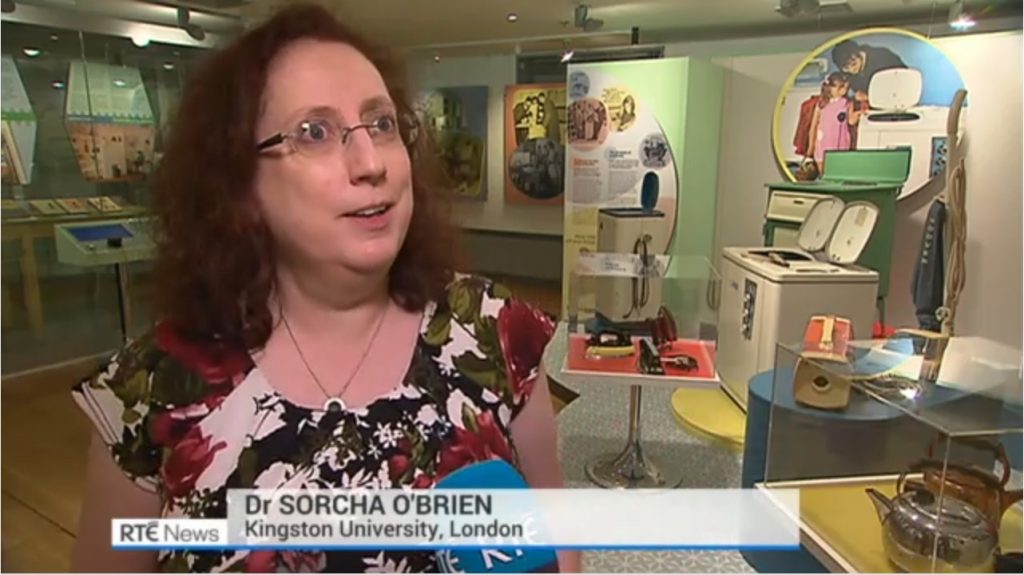
The Kitchen Power exhibition has received quite a bit of coverage on Irish TV and radio and in the newspapers in the last couple of weeks and I wanted to do a round-up of all that coverage here.
Television Coverage
RTÉ One News bulletin, 19th July, 1pm, starts approx. 12:30 (page opens in new window)
Segment by Pat McGrath, Western Correspondent (interviews with Sorcha, Deirdre McParland from the ESB Archives and Noreen Durken)
RTÉ Six One News bulletin, 19th July, 6pm, starts approx. 33:30 (page opens in new window)
Segment by Pat McGrath, Western Correspondent (interviews with Sorcha, Deirdre McParland from the ESB Archives and Noreen Durken)
Radio Coverage
RTÉ Radio 1, Morning Ireland, 19th July (page opens in new window)
‘Exhibition showcasing experiences of rural electrification opens in Co Mayo’ (interviews with Sorcha and Deirdre McParland from the ESB Archives, and clips from Ciunas Bunworth, Rose Mac Hugh and Noreen Durken)
Midwest Radio, 22nd July (audio to come)
Article featuring Mary Ann Egan and Josephine Scannell (page opens in new window)
Culture File, RTÉ Lyric FM, 23rd July, starts approx. 2:08:00 (page opens in new window)
Lorcan Murray’s Classic Drive (featuring an interview with Sorcha and clips from Maureen Gavan and Ciunas Bunworth)
Newspaper Coverage
Connaught Telegraph, 19th July (page opens in new window)
‘Mary Robinson launching Turlough exhibition on women’s experiences of rural electrification’
Irish Daily Star, 20th July (scanned image opens in new window)
Laura Colgan, ‘Gadgets n Girl Power’
Irish Examiner, 21st July (page opens in new window)
Ellie O’Byrne, ‘How electric-powered kitchen appliances revolutionised life for rural Ireland’s women in the 50s’ (interviews with Sorcha and Eileen Aylward)
Western People, 22nd July (scanned PDF opens in new window)
Paul O’Malley, ‘New exhibition revisits rural electrification / Ireland’s ‘quiet revolution” (interviews with Sorcha, Ciunas Bunworth, Maura McGuinness, Brigid O’Brien, Deirdre McParland from the ESB Archives, and Noel Campbell, NMI – Country Life)
Mayo Advertiser, 26th July (page opens in new window)
‘Former President launches Kitchen Power – Women’s Experiences of Rural Electrification’
Irish Independent, 2nd August (pageopens in new window)
Kirsty Blake Knox, ”Electric ‘heaven’: How women escaped drudgery of domesticity’ (quotes from Maureen Gavan and Noreen Durken)
Web Coverage
ESB Archives blog post, 24th July (page opens in new window)
‘Launch of ‘Kitchen Power’ exhibition’
Agriland.ie, 27th July (page opens in new window)
Caroline Allen, ‘Shining a light on women’s experiences of rural electrification’
The Journal.ie, 28th July (page opens in new window)
Orla Dwyer,”They can’t believe how we lived’ – How electricity cut down the drudgery of life in rural Ireland’ (interviews with Maura McGuinness and Bridie Tapley)
Woman’s Way, 30th July (page opens in new window)
Kitchen Power – Women’s Experiences of Rural Electrification
The Kitchen Power exhibition runs until July 2020 at the National Museum of Ireland – Country Life.
